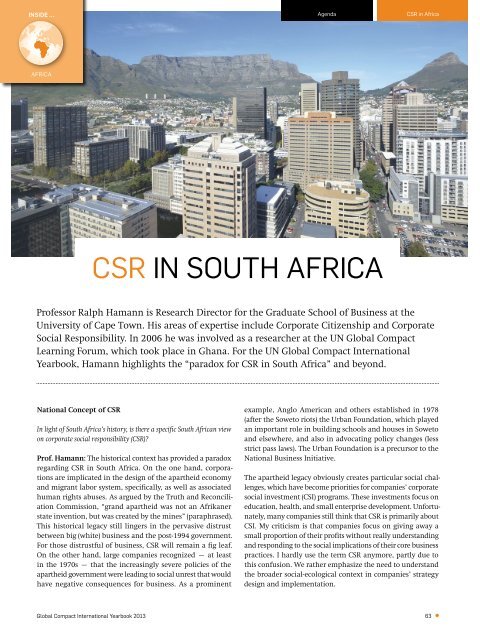Global Compact International Yearbook Ausgabe 2013
The UN Global Compact is the world’s leading platform for corporate sustainability. In describing the future aims of the Global Compact, UN Secretary-General H.E. Ban Ki-moon says: “A growing number of business in all regions recognize the importance of reflecting environmental, social, and economic considerations in their operations and strategies. Now the challenge is to move from incremental process to transformation – in society and markets alike.” The new 2013 edition of the Global Compact International Yearbook offers proactive and in-depth information on key sustainability issues and focuses on recent developments of stakeholder management such as managing corporate legitimacy, for example. Concomitant to this is the call for a more holistic reporting of companies’ financial and nonfinancial performance, which is expressed in the idea of integrated reporting. Furthermore, this edition highlights the connection between the sustainable development of African societies and the ways of managing and governing their natural wealth. The newest developments concerning the move toward a low-carbon economy are shown in the chapter on climate change, which emphasizes the importance of reducing the output of greenhouse gases. Corresponding to the idea of mutual learning, the Global Compact International Yearbook includes 43 good practices of corporate participants that showcase different approaches to the implementation of the Ten Principles of the Global Compact. The Global Compact International Yearbook is a product of the macondo media group and United Nation Publications in cooperation with the Global Compact Office in support of the UN Global Compact and the global advancement of corporate sustainability. It contains 196 pages.
The UN Global Compact is the world’s leading platform for corporate sustainability. In describing the future aims of the Global Compact, UN Secretary-General H.E. Ban Ki-moon says: “A growing number of business in all regions recognize the importance of reflecting environmental, social, and economic considerations in their operations and strategies. Now the challenge is to move from incremental process to transformation – in society and markets alike.”
The new 2013 edition of the Global Compact International Yearbook offers proactive and in-depth information on key sustainability issues and focuses on recent developments of stakeholder management such as managing corporate legitimacy, for example. Concomitant to this is the call for a more holistic reporting of companies’ financial and nonfinancial performance, which is expressed in the idea of integrated reporting. Furthermore, this edition highlights the connection between the sustainable development of African societies and the ways of managing and governing their natural wealth. The newest developments concerning the move toward a low-carbon economy are shown in the chapter on climate change, which emphasizes the importance of reducing the output of greenhouse gases.
Corresponding to the idea of mutual learning, the Global Compact International Yearbook includes 43 good practices of corporate participants that showcase different approaches to the implementation of the Ten Principles of the Global Compact. The Global Compact International Yearbook is a product of the macondo media group and United Nation Publications in cooperation with the Global Compact Office in support of the UN Global Compact and the global advancement of corporate sustainability. It contains 196 pages.
Create successful ePaper yourself
Turn your PDF publications into a flip-book with our unique Google optimized e-Paper software.
Inside ...<br />
Agenda<br />
CSR in Africa<br />
aFrica<br />
CSR in South Africa<br />
Professor Ralph Hamann is Research Director for the Graduate School of Business at the<br />
University of Cape Town. His areas of expertise include Corporate Citizenship and Corporate<br />
Social Responsibility. In 2006 he was involved as a researcher at the UN <strong>Global</strong> <strong>Compact</strong><br />
Learning Forum, which took place in Ghana. For the UN <strong>Global</strong> <strong>Compact</strong> <strong>International</strong><br />
<strong>Yearbook</strong>, Hamann highlights the “paradox for CSR in South Africa” and beyond.<br />
National Concept of CSR<br />
In light of South Africa’s history, is there a specific South African view<br />
on corporate social responsibility (CSR)?<br />
Prof. Hamann: The historical context has provided a paradox<br />
regarding CSR in South Africa. On the one hand, corporations<br />
are implicated in the design of the apartheid economy<br />
and migrant labor system, specifically, as well as associated<br />
human rights abuses. As argued by the Truth and Reconciliation<br />
Commission, “grand apartheid was not an Afrikaner<br />
state invention, but was created by the mines” (paraphrased).<br />
This historical legacy still lingers in the pervasive distrust<br />
between big (white) business and the post-1994 government.<br />
For those distrustful of business, CSR will remain a fig leaf.<br />
On the other hand, large companies recognized – at least<br />
in the 1970s – that the increasingly severe policies of the<br />
apartheid government were leading to social unrest that would<br />
have negative consequences for business. As a prominent<br />
example, Anglo American and others established in 1978<br />
(after the Soweto riots) the Urban Foundation, which played<br />
an important role in building schools and houses in Soweto<br />
and elsewhere, and also in advocating policy changes (less<br />
strict pass laws). The Urban Foundation is a precursor to the<br />
National Business Initiative.<br />
The apartheid legacy obviously creates particular social challenges,<br />
which have become priorities for companies’ corporate<br />
social investment (CSI) programs. These investments focus on<br />
education, health, and small enterprise development. Unfortunately,<br />
many companies still think that CSR is primarily about<br />
CSI. My criticism is that companies focus on giving away a<br />
small proportion of their profits without really understanding<br />
and responding to the social implications of their core business<br />
practices. I hardly use the term CSR anymore, partly due to<br />
this confusion. We rather emphasize the need to understand<br />
the broader social-ecological context in companies’ strategy<br />
design and implementation.<br />
<strong>Global</strong> <strong>Compact</strong> <strong>International</strong> <strong>Yearbook</strong> <strong>2013</strong> 63

















